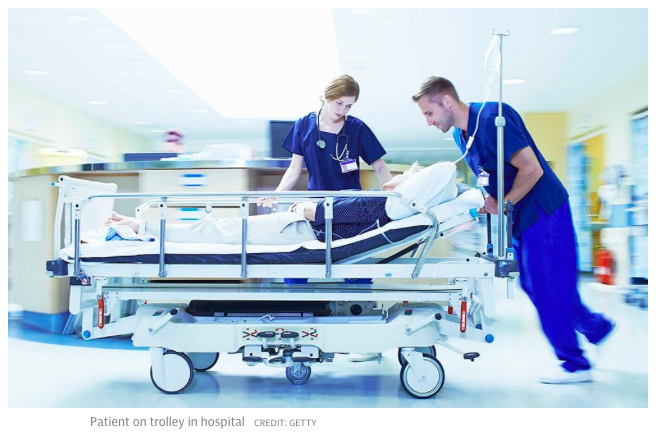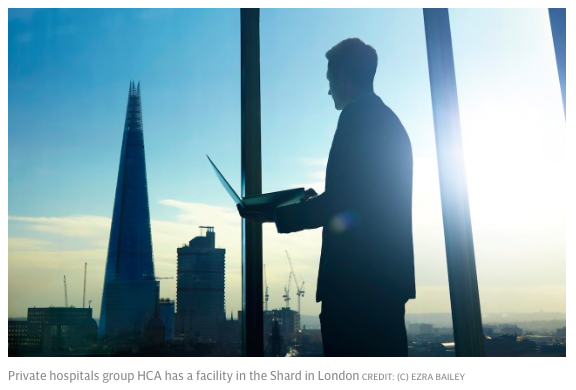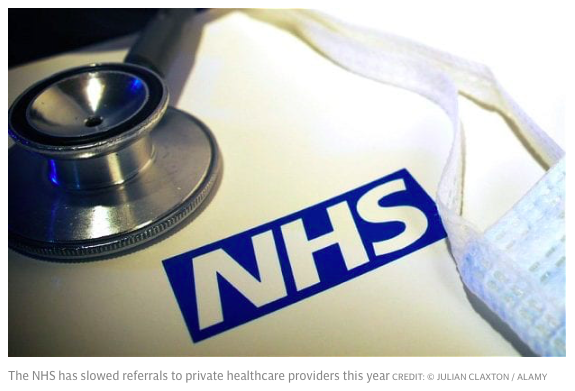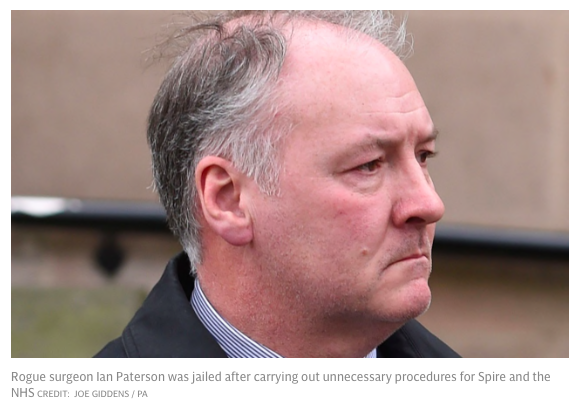Is the private healthcare market going into reverse?
 Justin Ash, the incoming chief executive of private hospitals group Spire Healthcare, has his work cut out.
Justin Ash, the incoming chief executive of private hospitals group Spire Healthcare, has his work cut out.
He takes the helm of the troubled FTSE 250 firm at the end of this month with its stock
floundering at near record lows after diving 28pc as a result of a gloomy update in the middle of September.
Alongside half-year results the company said it had set aside £27m to compensate victims of jailed rogue breast surgeon Ian Paterson, while NHS referrals for procedures such as knee and hip replacements – a key source of revenue – were abruptly down. Full-year sales and profits forecasts were reined in.
Then The Sunday Telegraph revealed Spire was shelving plans for a £500m private hospital in London, in part due to a dip in health tourism, particularly from the Middle East.
Mr Ash, who joins from Bupa-owned dental care business Oasis, told Spire’s investors that he was up for the challenge and confident of “rapid growth in private provision”.
But safety scandals, a slowdown in NHS work and a slide in health tourism all point to problems not just for Spire, but for the wider private healthcare industry. Is the once-booming sector going into reverse?
Up until recently growth had been accelerating, hitting £5.6bn in value in 2015, 4.4pc higher in real terms than the previous year, according to research firm LaingBuisson. This followed growth of 4.3pc in 2014 and 2.4pc and 2.9pc in the preceding two years.

However, experts believe it’s not just Spire seeing a marked slowdown in 2017. The reason for the drop in NHS referrals to private providers stems from a speech given by NHS England chief executive Simon Stevens in April.
He said the public health service should focus its resources on A&E and cancer treatment and less on elective procedures such as hip and knee replacements or cataract operations. Consequently referrals for these elective procedures have dived.
NHS Partners Network is the trade body for private partners of the NHS. Its chief executive, David Hare, says its members have been feeling the squeeze.
“Year-on-year the amount of referrals from the NHS is flat, whereas previously it was enjoying 3-4pc annual growth,” he says.
Spire has been hit particularly hard as NHS referrals account for almost a third of its £926m annual revenues. The drop will lead to “significantly lower than anticipated revenues” for the full-year, the firm said last month, while margins will be as much as 0.7pc lower at around 16.1pc.
Dan Mahony, at investor Polar Capital, says Spire – which declined to comment for this article – is paying for being “over-reliant on particular procedures”, namely hips and knees, but he says it is far from alone.
“We invest globally and try to go where legislation is going in private providers’ favour,” he says. “Three to four years ago it was the UK, with the NHS’s push towards ‘choose and book’ that gave patients the option of private. Now the pendulum is swinging back a bit. It will swing back in time.”

Explaining the decision to cool on the idea of taking on arch hospital rivals HCA and Bupa in London, Spire said a fall in health tourism was a significant factor, alongside onerous business rates and high property prices.
“Increasingly people’s health problems are being dealt with in their domestic market, particularly in the Middle East,” said then interim boss Simon Gordon. One only needs to look at the success of rapidly growing NMC Health – the Gulf private hospitals group that gatecrashed the FTSE 100 last month – to see companies are now providing top quality healthcare in this previously under-resourced market.
Andrew Coombs, commercial director for US healthcare giant HCA’s UK business, agrees there are “fundamentally less people leaving the Middle East to travel for care” than a year ago. But he describes it as “the only major negative” in an overall picture of “good growth”.
HCA is continuing to expand in the UK, with a private wing to an NHS hospital to open soon in Birmingham, while it is investing in complex therapy areas such as cancer treatment facilities.
It helps that HCA gets virtually none of its revenues from NHS referrals. Revenues from private medical insurance – the mainstay for most private healthcare providers – is going up “modestly” as it captures share in a falling market.
HCA also has great hopes for the “self-pay market” – where patients who are generally uninsured pay for treatments on demand. It’s an area where the firm is seeing “double digit growth”, according to Coombs, and was one of the few bright spots in Spire’s numbers last month as well.
NHS Partners Networks – which this week made a formal offer to the NHS to utilise its private facilities during the coming winter rush for 380,000 procedures – says the self-pay segment of the market is likely to be boosted by the slowdown in NHS referrals.
“As waiting times push out, those who can, will pay for operations,” he says.

Julie Simmonds, analyst at Panmure, questions how long the NHS’s purge on elective procedures can continue: “These patients will need treating at some point, therefore I would see the current downturn as a timing issue rather than something that is likely to be sustained.
“Once waiting lists reach critical levels it is likely that referrals will pick up again – probably in response to a specific injection of funding.”
Polar Capital’s Mahony agrees that something’s got to give, but he thinks ultimately it’s the system that will change under the inexorably growing pressure of an ageing population, that is more enabled by digital innovation.
“We will each become more responsible for paying for and managing our own health,” he says. “In some parts of the country you can already get an online consultation with a GP for £20. You can barely get a round of drinks in London for that. It’s getting to a price point where it can really take off.”
But affordable private healthcare is all very well, so long as people trust that it is safe.
The Paterson case was a body blow for the sector as most of his victims – 750 – were private patients, at Spire hospitals between 1993 and 2012, although a further 270 were also on the NHS. As well as setting aside £27.2m in compensation, Spire says it has tightened up its checks and procedures to minimise the possibility of it happening again.
Spire’s rivals are also not immune to scandal, albeit on a smaller scale. Two patients in their 50s have died in recent years in HCA London hospitals due to negligent use of equipment.
HCA UK’s Coombs says patient safety and quality care is “at the heart of what we do” and he had “been impressed at the time and effort we have spent on this” since he joined the company last year.
Hare says private hospitals are regulated in the same way as the NHS, by the Care Quality Commission, and maintains that they have “a good level of safety and quality”.
After a year that private providers will likely want to forget, squaring the sector’s commercial challenges with making patients better, safely, has never been more important.
By: Iain Whiters
Source: http://www.telegraph.co.uk/









